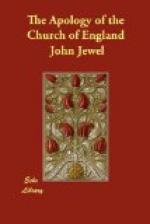There have been, I know, certain of their own selves which have found fault with many errors in the Church, as Pope Adrian, AEneas Sylvius, Cardinal Pole, Pighius, and others, as is aforesaid: they held afterwards their council at Trident in the selfsame place where it is now appointed. There assembled many bishops, and abbots, and others whom it behoved for that matter. They were alone by themselves; whatsoever they did, nobody gainsaid it; for they had quite shut out and barred our side from all manner of assemblies: and there they sat six years, feeding folks with a marvellous expectation of their doings. The first six months, as though it were greatly needful, they made many determinations of the Holy Trinity, of the Father, of the Son, and of the Holy Ghost, which were godly things indeed, but not so necessary for that time. Let us see, in all that while, of so many, so manifest, so often confessed by them, and so evident errors, what one error have they amended? from what kind of idolatry have they reclaimed the people? What superstition have they taken away? What piece of their tyranny and pomp have they diminished? As though all the world may not now see that this is a conspiracy and not a council; and that those bishops whom the Pope hath now called together be wholly sworn and become bound to bear him their faithful allegiance, and will do no manner of thing but that they perceive pleaseth him, and helpeth to advance his power, and as he will have it; or that they reckon not of the number of men’s voices rather than have weight and consideration of the same; or that might doth not oftentimes overcome right.
And therefore we know that divers times many good men and Catholic bishops did tarry at home, and would not come when such councils were called, wherein men so apparently laboured to serve factions and to take parts, because they knew they should but lose their travail, and do no good, seeing whereunto their enemies’ minds were so wholly bent. Athanasius denied to come, when he was called by the emperor to his council at Caesarea, perceiving plain he should but come among his enemies, which deadly hated him. The same Athanasius, when he came afterward to the council at Syrmium, and foresaw what would be the end by reason of the outrage and malice of his enemies, he packed up his carriage and went away immediately. John Chrysostom, although the Emperor Constantius commanded him by four sundry letters to come to the Arians’ council, yet kept he himself at home still. When Maximus, the Bishop of Jerusalem, sat in the council at Palestine, the old Father Paphnutius took him by the hand, and led him out at the doors, saying, “It is not lawful for us to confer of these matters with wicked men.” The bishops of the East would not come to the Syrmian council after they knew Athanasius had gotten himself thence again. Cyril called men back by letters from the council of them which were named Patropassians. Paulinus, Bishop of Triers, and many others more, refused to come to the council at Milan when they understood what a stir and rule Auxentius kept there: for they saw it was in vain to go thither, where not reason, but faction, should prevail, and where folk contended not for the truth and right judgment of the matter, but for partiality and favour.




